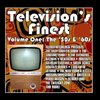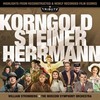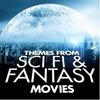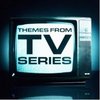Soundtrack Information
Music From
- The Twilight Zone (1959) [TV Series]
Music By
- Various Artists
- Jerry Goldsmith
- Bernard Herrmann
- Leonard Rosenman
- Franz Waxman
Track Listing
Related Albums

The Twilight Zone / The Outer LimitsLimited Edition of 1,000 Copies
Death Waltz RecordingReleased: April 20, 2013
Format: Vinyl

Fahrenheit 451 / The Twilight Zone: Walking DistanceTribute Film Classics (TFC-1002)
Released: November 26, 2007
Format: CD (78 min)

The Twilight Zone - IIISoundtrack Listeners Communications Inc. (SLCS-7082)
Released: 1999
Format: CD (49 min)

The Twilight Zone - IISoundtrack Listeners Communications Inc. (SLCS-7081)
Released: 1992
Format: CD (50 min)

The Twilight Zone - IVSoundtrack Listeners Communications Inc. (SLCS-7083)
Released: 1992
Format: CD (57 min)

The Twilight Zone - VSoundtrack Listeners Communications Inc. (SLCS-7084)
Released: 1992
Format: CD (40 min)

The Twilight Zone - ISoundtrack Listeners Communications Inc. (SLCS-7080)
Released: 1991
Format: CD (47 min)

Television's Finest, Volume One: The '50s & '60s
Released: August 14, 2012
Formats: CD, Digital (50 min)

Tribute Film Classics HighlightsTribute Film Classics (TFC 1008)
Released: January 24, 2012
Format: CD (74 min)
Review: Twilight Zone: The 40th Anniversary Collection
4.5 / 5 Stars
Silva Treasury recently released a 4-CD compilation album entitled "The Twilight Zone: The 40th Anniversary Collection". Containing over four-and-a-half hours of original recordings from the series, it is quite an impressive set.
The first two tracks on the first disc are the original main titles to "The Twilight Zone", written by composer Bernard Herrmann. Herrmann wrote a theme for the show that was only used for the first season, and differs significantly from Marius Constant's classic "Twilight Zone" theme, which didn't show up until the second season. An 11-minute suite of music from the pilot episode "Where Is Everybody" is presented here. This music captures the essence of the series, with plenty of suspense and drama as only Bernard Herrmann could do. (It was around the time he was working on Psycho that he wrote this music, so there are some emotional similarities.)
Of great interest on this disc is the inclusion of "The Outer Space Suite" - a series of library cues that Herrmann wrote in 1957 that had been used in numerous episodes of "The Twilight Zone". These cues are pretty generic, but that's because they are library cues. So, for instance, "Time Suspense" could easily fit a number of given situations - but all inspired by the idea of suspense over time. A lot of string and harp work is present in this suite, as it was present in the Main Titles.
Suites from the episodes "Walking Distance", "The Hitchhiker", and "The Lonely" are also included on this disc, mixed in between two sets of alternate Main and End Titles. The first alternate main title is much more harsh and brassy, and a bit too forceful than the one they used. The score to "Walking Distance" is quite calm and flowing, with an underscore of drama and small town ambiance - lots of strings and woodwinds in this one, with no percussion. "The Hitchhiker" takes a similar tone, but uses a brass section as well.
The second disc begins with French composer Maurice Constant's now famous Main Title theme to "The Twilight Zone". The rest of the disc features the work of Jerry Goldsmith. The first Goldsmith cue on the album, "Back There" is a 12-minute suite featuring a small string ensemble and a harpsichord that showcases Goldsmith's capabilities as a composer. Much of the cue is suspenseful, but there is also a great bit in the last minute of the cue that can be looked upon as a sign of where Goldsmith would go, many years later - the suspenseful chords are so familiar nowadays - but back then, Goldsmith was at the beginning of his career!
The highlight of this disc is the suite from "The Invaders" - which allowed Goldsmith free range to try all sorts of unconventional orchestral effects - many of which resurfaced years later in Twilight Zone: The Movie. Also included on the album are two "Jazz Theme" cues, both of which differ from each other, and also show off Goldsmith's ability to score completely different types of music. Some of the atonal and percussive work in "Nervous Man in a $4.00 Room" reminded me, at times, of Goldsmith's score to Planet of the Apes, which wouldn't be written for over eight more years.
The third disc features music from composer Nathan Van Cleave, and starts out with one of the most famous of all "Twilight Zone" episodes: "Perchance to Dream". Utilizing electronic instruments, including a theremin, Van Cleave provides adequate suspense and rising fear in this classic story about a man afraid to fall asleep. The score he wrote to Ray Bradbury's "I Sing The Body Electric" was the only episode whose music was recorded in stereo - and the quality difference was apparent. The sound was much fuller, and the fidelity much higher. Nathan Scott's music to "A Stop At Willoughby" is fairly slow, and does a rather nice job setting up the sentimental feelings of the episode.
This fourth disc provides us with an alternate Main Title by Maurice Constant. It begins much differently than the Main Title we all know and love, but it ends the same way - very interesting to hear this cue. Fred Steiner's western score to "100 Yards Over The Rim" starts out with a traditional harmonica to set the scene, but when things start to go strange (in the episode, 19th century pioneers come across a 20th century town), lots of silent spots and percussive tones make this a rather minimalist score of sorts. Two other scores are presented here, "King 9 Will Not Return" and "The Passerby", each containing plenty of suspense and drama. "King 9" makes good use what sounds like a sliding cello, and "The Passerby" has plenty of suspenseful strings to add tension to the episode. Leonard Rosenman's dark music to "When The Sky Was Opened" is also included on this disc, as is the light - almost comedic at times - score to "The Trouble With Templeton", by Jeff Alexander. Franz Waxman provides a jazzy score for "Sixteen Millimeter Shrine", which resounds of similarities (both musically and plot-wise) to Sunset Boulevard, which Waxman had scored a almost a decade before.
Much of the music here would only be of interest to truly devoted fans of the show, or fans of Bernard Herrmann and Jerry Goldsmith (who are the two composers really featured in this set). But it was still great to hear some of the early works by these composers, and the others who contributed to some of the better episodes of "The Twilight Zone". The liner notes in this album are reasonably detailed, but the photographs they used from the episodes are disturbingly poor. They are so pixilated that one has to wonder if some sort of production mistake was made - it's as if someone downloaded them off the Internet and tried to fix them up! (Yet the CBS Photo Archives are credited as providing the photos!) But that is a minor detriment to a compilation album that should be recognized as being truly a tribute to this amazing and fascinating television show.
Soundtrack.Net Articles
-
Click stars
to rate.
If any information appears to be missing from this page, contact us and let us know!









